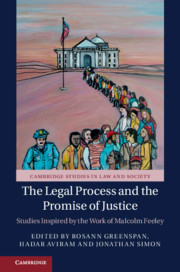Book contents
- The Legal Process and the Promise of Justice
- Cambridge Studies in Law and Society
- The Legal Process and the Promise of Justice
- Copyright page
- Contents
- About the Contributors
- Introduction: Past as Prologue
- Part I The Process Is the Punishment
- Part II Court Reform on Trial
- Part III Judicial Policymaking and the Modern State
- Part IV Political Liberalism and the Legal Complex
- 15 The International Legal Complex: Wang Yu and the Global Response to Repression of China’s Rights’ Lawyers
- 16 The Legal Profession’s Promise of Justice: Choices and Challenges in Legal and Sociolegal Work
- 17 The Varieties of Judicial Independence and the Judiciary’s Role in Political Reform
- 18 The Legal Complex and Lawyers-in-Chief
- Index
- Books in the Series
- References
16 - The Legal Profession’s Promise of Justice: Choices and Challenges in Legal and Sociolegal Work
from Part IV - Political Liberalism and the Legal Complex
Published online by Cambridge University Press: 18 April 2019
- The Legal Process and the Promise of Justice
- Cambridge Studies in Law and Society
- The Legal Process and the Promise of Justice
- Copyright page
- Contents
- About the Contributors
- Introduction: Past as Prologue
- Part I The Process Is the Punishment
- Part II Court Reform on Trial
- Part III Judicial Policymaking and the Modern State
- Part IV Political Liberalism and the Legal Complex
- 15 The International Legal Complex: Wang Yu and the Global Response to Repression of China’s Rights’ Lawyers
- 16 The Legal Profession’s Promise of Justice: Choices and Challenges in Legal and Sociolegal Work
- 17 The Varieties of Judicial Independence and the Judiciary’s Role in Political Reform
- 18 The Legal Complex and Lawyers-in-Chief
- Index
- Books in the Series
- References
Summary
This chapter provides a socio-legal perspective on justice in the legal profession and in legal scholarship by bringing together the values of idealism and humanism with ambition, materialism, and science. For lawyers and judges, the practice of justice may be guided by contradictory pulls toward public-spirited idealism (for instance, helping an indigent client or promoting social transformation) and self-serving materialism (for instance, increasing personal earnings or improving reputation). For legal scholars, studies of law emanate from sometimes conflicting impulses to build social theory and the rule of law, adopt social scientific research designs, and achieve personal goals that improve one’s renown. Exposing these tensions in pursuing justice and in writing about justice reveals the promises and perils of legal practice and legal scholarship.
- Type
- Chapter
- Information
- The Legal Process and the Promise of JusticeStudies Inspired by the Work of Malcolm Feeley, pp. 314 - 334Publisher: Cambridge University PressPrint publication year: 2019

